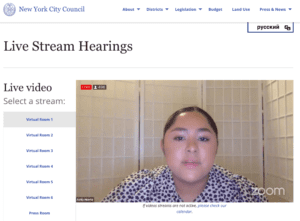
Young Invincibles’ advocate Ashly Huerta testifies before New York City Council on Friday, October 16.
How has the nation’s largest urban public university responded to students’ mental health needs during the COVID-19 pandemic? On Friday, October 16, our New York Young Advocates testified before New York City Council to share their experiences accessing mental health support during the pandemic. They also provided recommendations for improving CUNY’s mental health services, including recommendations on better serving Black and brown students, students with disabilities, and the thousands of working students enrolled at CUNY.
Our students’ testimonies are linked here, and a video of the hearing can be found here. Below are key insights our Advocates shared at the hearing:
CUNY’s mental health services are understaffed and underfunded — with real implications for CUNY students’ success.
“Most CUNY campuses are severely understaffed with mental health professionals, forcing students to be put on a waitlist. While they wait, college courses continue, with no leeway to take needed time off and stay on course to graduate.” – Neha Syeda, Junior at Brooklyn College, and Policy and Advocacy Fellow at Young Invincibles
“I have seen countless peers leave school because it was emotionally draining, and there was an absence of support.” – Claudia Wallen, Junior at New York City College of Technology
Students want mental health counselors from their communities, including more Black and brown counselors, LGBTQ counselors, and those who specialize in working with students with disabilities.
“When I was seeking counseling services at John Jay’s Wellness Center, I was given an intake appointment and then put on a waitlist- a waitlist that took over a month before I could see any counselor. In my initial intake appointment, I had requested a female counselor, possibly one of color, because I wanted a counselor I could relate to, and feel comfortable sharing certain information with. When I finally reached the top of the waitlist and was assigned to a counselor, the counselor was a white male.” – Aileen Luna, Senior at John Jay College of Criminal Justice
Counselors must be able to address the real challenges students are facing — particularly during the COVID-19 pandemic.
“Being in the midst of a pandemic, midterms are not the only issue we are stressing about; rather, facing eviction or the fear of potentially contracting a deadly virus by simply doing something as essential as grocery shopping is elevating students’ anxiety… These counseling sessions are failing to address that the circumstances during a regular semester do not compare to what we are currently experiencing.” – Diana Valenzuela, Sophomore at Bronx Community College
